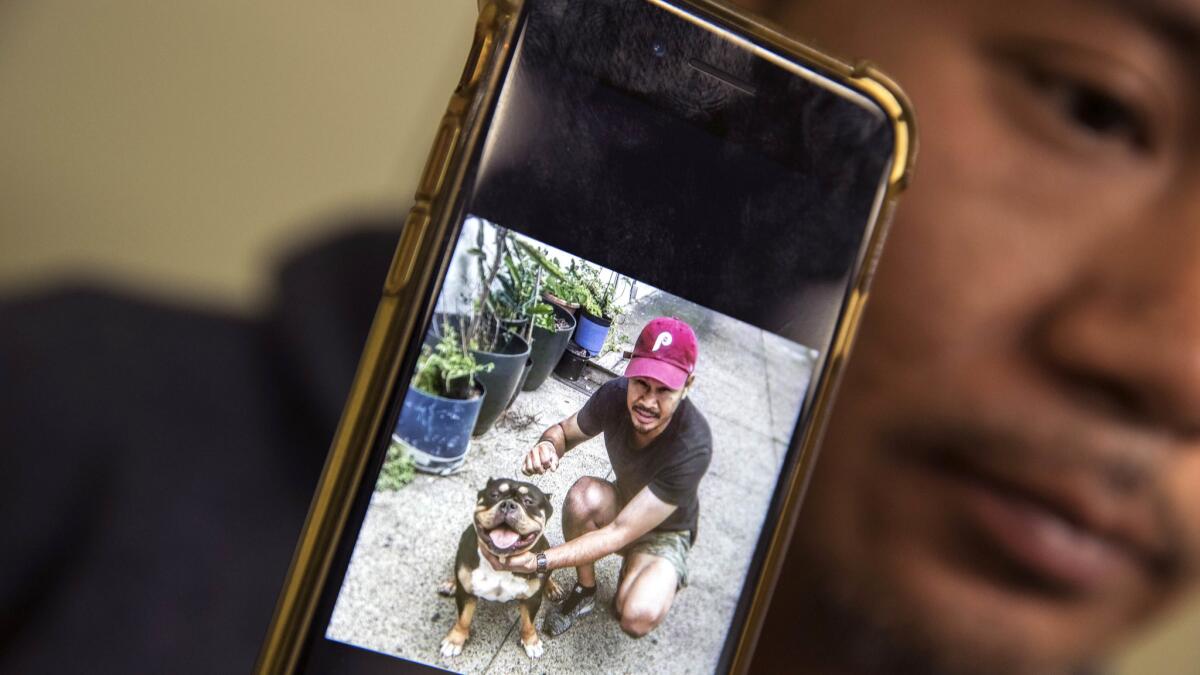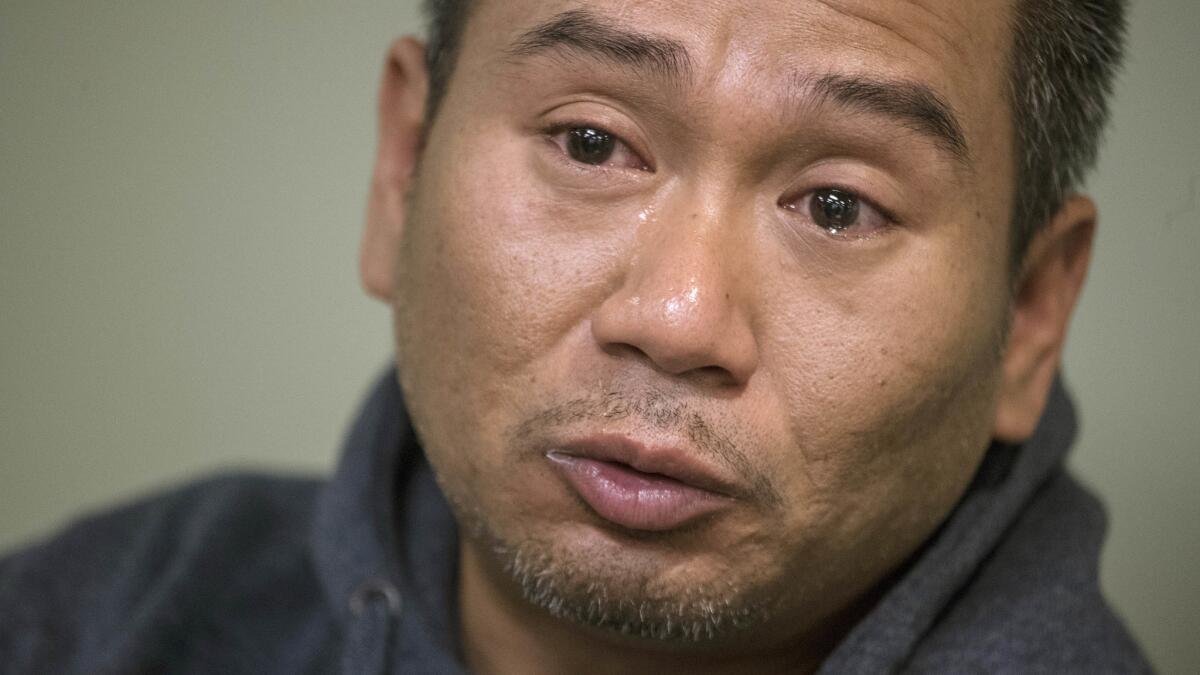ICE raids are targeting Cambodian immigrants caught between two countries, advocates say

- Share via
Nak Kim Chhoeun entered the federal building in downtown Los Angeles a few weeks ago for his immigration check.
He had been reporting to immigration authorities like this every year since being convicted of assault and unlawful gun possession in 1999. This time the Cambodian refugee never came out, said his cousin Posda Tuot, who drove him to his immigration appointment.
More than a hundred people of Cambodian descent have been detained in a similar fashion over the last month as the Trump administration steps up its efforts to persuade resistant countries to accept deportees, advocates say.
The San Francisco and Los Angeles chapters of Asian Americans Advancing Justice have filed suit against the federal government to stop the detentions, calling them illegal and demanding the detainees be released.
“There was no process, no hearing, no evidence, no cause to support the detention of these people,” said Anoop Prasad, an attorney with the San Francisco chapter.
Immigrants detained for deportation must be released after six months if authorities cannot prove they are a flight risk or danger to society, said Laboni Hoq, litigation director for the L.A. office of Asian Americans Advancing Justice, or AAAJ.
Last week, Los Angeles County Supervisor Janice Hahn wrote a letter warning federal officials against using the detainees as “bargaining chips” to compel Cambodia to accept more deportees.
“My residents and their families cannot be used as pawns,” Hahn said.
Immigration authorities say they are enforcing federal law and that their actions are supported by international laws that require countries to accept the return of their citizens when asked.
Cambodia was one of the four nations hit with visa sanctions in September after they refused to cooperate with the administration’s deportation efforts, said Lori Haley, a spokeswoman for Immigration Customs and Enforcement. Visa restrictions have also been placed on certain travelers from Eritrea, Guinea and Sierra Leone.
“The United States continues to work with the Government of Cambodia to establish a reliable process for the issuance of travel documents and their acceptance of the prompt, lawful return of Cambodian nationals who are subject to removal from the United States,” Haley said in a statement.
But it’s not clear whether authorities in Cambodia or any of the other countries have decided to accept all the new detainees. Channoch Vong, first secretary of the Cambodian Embassy in Washington, said that U.S. and Cambodian officials discussed the issue in early October, but there is no schedule for deportations yet. Officials at the Cambodian consulate in Long Beach said they have not been instructed to prepare any travel documents for the recent detainees.
The suit also argues that detainees should not be deported because they are effectively American. Many of the detainees were born in refugee camps and have never set foot in Cambodia. They have Cambodian nationality because of their parents but little experience of the country’s culture and language.
Cambodia has refused to issue travel documents to such individuals in the past in part because they struggle to function in a country that is unfamiliar to them. Cambodian officials have accepted only about 500 people for repatriation since 2002, an average of 35 a year.
Chhoeun, who came to the U.S. as a refugee when he was 6 years old, was convicted on one charge of aggravated felony in 1999. After prison he was a different person, Tuot said. Suddenly he refused to violate crosswalk signals or drive over the speed limit, Tuot said. Chhoeun, who was like an older brother to Tuot, constantly told him to stay out of trouble.
“He did his time and came out changed,” Tuot said. “Yet America deports him for something he did early in his life.”
He did his time and came out changed. Yet America deports him for something he did early in his life.
— Cambodian refugee Posda Tuot

Chhoeun, 42, has worked as an AT&T technician for 14 years. He never got married and never had children, Tuot said, knowing that his time in America was limited. He was born in Cambodia in 1975, the year the Khmer Rouge launched a four-year campaign of terror and genocide that left nearly 2 million Cambodians dead. He spent most of his childhood in a Thai refugee camp and doesn’t remember Cambodia at all, Tuot said.
Across the country, more than 1,900 people of Cambodian descent are subject to immediate detention and deportation, said ICE officials, though there are no plans to detain all of them. More than 1,400 have criminal convictions, according to ICE figures.
Community advocates say the criminal records of many deportees are a side effect of the neighborhoods that their parents, mostly impoverished refugees, were forced to settle in.
“A lot of these people have records because they grew up in poverty-stricken, high-crime neighborhoods,” said Susana Sngiem, executive director of the United Cambodian Community nonprofit in Long Beach. “Now they have families and full-time jobs that they stand to lose.”
Narun Ployngam, 40, came to America when he was 3 years old. He served 10 years in prison after he was convicted of robbery in 2007. He was released this year and allowed to remain in the country under supervision.
After prison he got a job building wooden pallets, and he recently obtained a certification to drive a forklift. He watched football on Sundays, rooted for the Oakland Raiders and aspired to start a landscaping company, said his wife, Mavis. He was eager to get to know his son and daughter, who were just 5 and 12 when he was incarcerated.
He had just four months with his son, who was shot to death in Stockton in June at the age of 15.
A few weeks ago, he was told to report early for his annual immigration check. He never came back, Mavis said.
“He’s my rock,” she said. “Why are you taking my husband away?”
Twitter: @frankshyong
More to Read
Sign up for Essential California
The most important California stories and recommendations in your inbox every morning.
You may occasionally receive promotional content from the Los Angeles Times.











